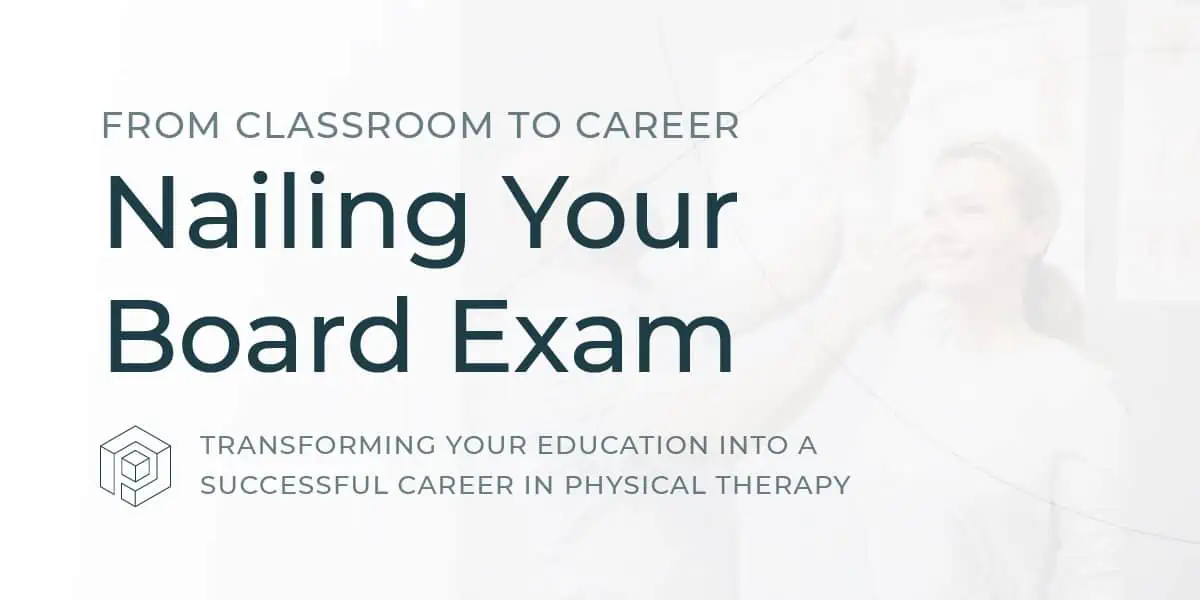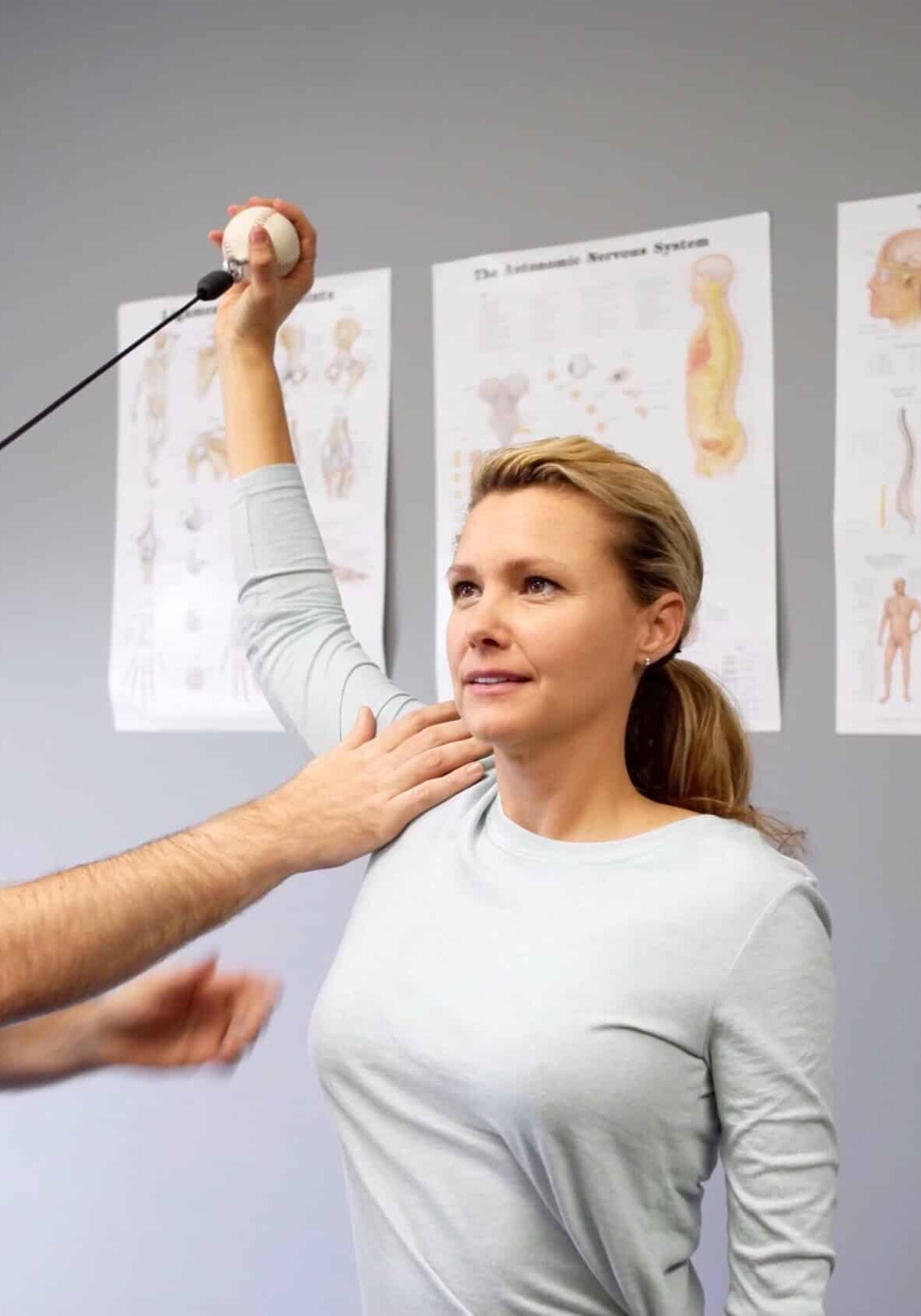
From Classroom to Career
Nailing Your Board Exam
Before you can begin your dream career as a physical therapist, you will need to pass the National Physical Therapy Exam (NPTE). The NPTE is designed to test your knowledge before you can earn your professional PT license. You have worked hard to get to this point, so you don’t want this last hurdle to trip you up. But if you create a good plan, study hard, and persevere, you will ace the exam and move forward in your career as a physical therapist.
The Basics
The NPTE is offered quarterly in January, April, July, and October. In each of these months—except July, which offers two testing days—there is only one testing day.
You can take the NPTE a total of six times in your life, but The Federation of State Boards of Physical Therapy (FSBPT) reports that those who need to take the exam more than two times typically do not pass on subsequent attempts. You can only take the exam three times in any 12-month period, and no more than three consecutive times before you’ll be required to skip an exam date. If you take the exam twice and get two failing scores of 400 or below, you will be barred from taking the exam again (600 is the minimum passing score).
Obviously, passing the NPTE is a big deal. Below are 7 tips to help you nail the exam and move forward in your dream career.
1. Make your most important decision first
Decide whether or not you can start a job and study simultaneously or if you should take time off to study. The NPTE is a major exam and it will require a lot of mental energy in order to pass it. Take the time to think seriously about whether you can reasonably balance work and studying.
2. Create a Detailed Study Schedule
Create a calendar to pass the boards in a set amount of time (10, 12, 16 weeks, etc.) and set your plan accordingly. Be sure to leave a few days open in case you get behind or need to add an additional resource to your study plan. Leave the day before the test and the day of the test open for rest and sleep. Many past exam-takers say this is key to not stressing yourself out before the exam.
The NPTE has 250 questions and 75% of them are on “the big three topics”: musculoskeletal, neuromuscular, and cardiovascular. Focus your attention on those areas, especially if you have a weakness in one of them, but don’t ignore the other topics. Read the FSBPT NPTE Exam official content outline so you know exactly what to expect based on any updates or changes the organization makes from year to year.
3. Study to pass the test
If you didn’t know the content by now you wouldn’t have graduated. Don’t cram content! The NPTE exam questions will ask you to apply what you’ve learned to real-world scenarios, which means that memorizing terms and facts isn’t necessarily your best approach. To answer questions, you’ll be combining information you’ve gained from coursework, case studies, academic articles, and hands-on work experience. So, as you prepare for the NPTE, make sure you understand concepts, rehabilitation treatment strategies, outcome measures, and current best practices in the field for addressing patients’ conditions.
4. Invest in the right study material
It’s crucial to find the study guides (Ex. PhysicalTherapyEd, Scorebuilders, TherapyEd) that work best for you and your learning style. Online resources offer a broad range of study suggestions from phone apps to hardcopy study guides that accommodate a variety of learning preferences. Using a range of learning and study modalities will keep your study sessions fresh and interesting, helping you avoid feeling overwhelmed and fatigued.
5. Study Well
Again, use the techniques that work best for you. Here are some ideas:
- Create a two-sided, 8.5” x 11” study sheet with lab values, nerve innervations, arthrokinematics, special test, etc. Memorize it and practice writing it down without looking. You’ll need to have this down two days before taking the test. Since most of the questions will be assimilating information, you will need to have this information solidly in your brain in order to reference it for the exam.
- Try flashcards. If you know less than 80% of a specific topic, make a flashcard in the form of a question with the answer on the back. Aim for several hours of study daily and make note of the cards you get wrong. Go back and review those before moving on to new material.
- Use spaced repetition to spread out your studying of a topic and revisit the material periodically through flashcards, quizzes, and mnemonics. This helps to solidify the content in your brain and gives you more opportunities to relate material to new content you study.
- Teach what you know. One of the best ways to learn a topic is to teach it to others. If you’re struggling to understand a topic, try creating a small review chart or study page you can teach to someone else. By summarizing concepts, you force yourself to draw out the key points you need to remember. Get with other students taking the NPTE and teach each other. By verbalizing the concepts to others, you will quickly find out how well you know a particular topic.
6. Take lots of practice tests
Most NPTE prep books will give you at least three practice exams. Take them all. In fact, take as many as you are able to afford and complete. You will learn how questions are being asked, what types of questions trip you up, and which areas are weak and need more study. Taking practice tests will help you to feel more comfortable and less stressed when you walk into the room to take the test. You can purchase retired NPTE exams from FSBPT. They are worth every penny you spend. The key to using them is to set aside the day after to review every question and understand why you got each question right or wrong. Create a list of the topics you need to review in detail. Reread those sections in your prep books to understand the key things you missed and continue to review those areas each week.
7. Schedule a time slot in the afternoon
Get a good night’s sleep the night before the test—no late-night study sessions! Wake up the day of the test refreshed and calm. If it won’t stress you out, review your study sheet a few times before going into the exam. Take your time and nail it.
Additional Resources
NPTE Podcast —This podcast covers a variety of subjects, including specific topics on the exam, mental preparedness, and info on the latest NPTE updates or changes.
PT Hustle —A YouTube channel offering useful playlists for test prep, including videos with test-taking tips, recorded lectures on relevant content for the exam, and practice questions.
Quizlet —Dozens of NPTE exam prep materials, from flashcards to sample exam questions, for free.
TherapyTeam.com —Offers online self-study, self-study apps, live seminar courses, and a five-week tutoring course and a mobile app.
Join Our Team
We Believe In Life Changing Impact
Find work that inspires you at PhysioPoint Physical Therapy.
Join our team of dedicated professionals and enjoy an environment that values your passion for patient care.
Awaiting graduation? No problem! We'd love to talk to you. Apply below and take the first step into your career.


